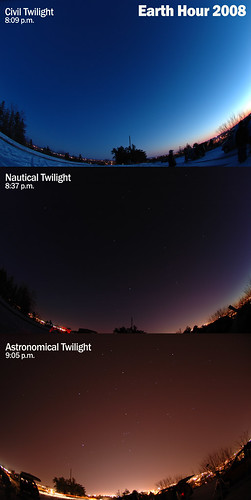In order to be absolutely certain about the lighting conditions on our wedding day, I consulted http://www.timeanddate.com/ to get the lowdown on sundown for November 11, 2011 in San Francisco.
screenshot taken from here
At this point you may be thinking what I was thinking: "What's the difference between astronomical, nautical, and civil twilight, what do they have to do with sunset, and how do they impact my wedding?" Well folks, I'm here to answer that question for you in as brief and painless a way as possible. And I promise that, if you're having an evening wedding or an early morning, you do care about this information..
(Note: I am summarizing this from several sources, but primarily here. I am in no way an expert on this issue, so please feel free to correct me if I'm wrong.)
Astronomical Twilight: The beginning and end of light during the day. Faint stars, galaxies, and other objects begin to disappear as this phase starts and they reappear as this phase ends. The end of astronomical twilight would be prime city lights-viewing conditions.
Nautical Twilight: The middle of the full sunrise/sunset process. Bright objects are visible in the sky, as is the horizon. It is too dark to do activities outside without extra lighting, but some light remains. Not the ideal light-gazing opportunity, but not impossible.
Civil Twilight: During this phase the sky is illuminated and you will not need additional lighting for outdoor activities. In the evening, only bright lights will be visible. Good enough to see a full moon, but not good enough to take advantage of all the city lights.
photo via yimg.com
Sunrise: When the upper part of the sun becomes visible.
photo via Esquire.com
Sunset: When the sun disappears below the horizon.
photo via intrepid.com
As all of us already know, light becomes visible before the sun has actually risen above the horizon line in the morning, and light remains visible after the sun falls below the horizon in the evening. Thus it's not that helpful to look only at sunrise and sunset times if you're interested in gauging the amount of light you'll see in the early morning or late evening.
And now comes the part where I super excitedly tell you the good news about our wedding day. If you study the chart above you'll see that on 11.11.11 astronomical twilight ends at 6:32 p.m. Purely by chance, we slated our wedding ceremony to begin at... 6:30 p.m.! Yay for prime nighttime darkness! Crazily enough though, if you take a closer look at that chart, you'll also see that daylight savings time ends A MERE 5 DAYS before our wedding date. So if we had picked a date only a week earlier, then a half hour ceremony beginning at 6:30 would've meant that it would just be getting dusky outside (end of civil twilight, going into nautical twilight) and we would have completely missed out on that city lights look we love so much.
Clearly the stars were aligned for us (astronomical pun intended). Oh, you don't believe me? You want proof? I'll give you proof.
{November 11, 2011... Full. Freakin'. Moon.}
image via Moon Connection
Bam! There's your proof. I know I'm more than bit biased, but I'm pretty sure we have the absolutely awesomest wedding date and time ever, and I dare you to deny it. :-)
How have the stars aligned for you and your significant other? And do you have a need to track the light for your wedding day?





No comments:
Post a Comment
Note: Only a member of this blog may post a comment.